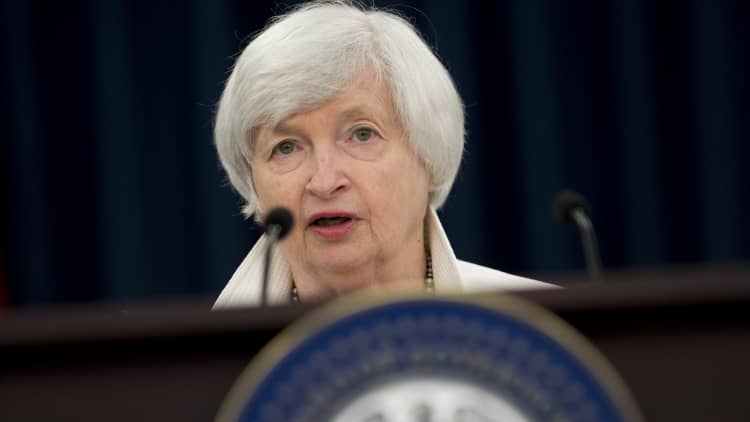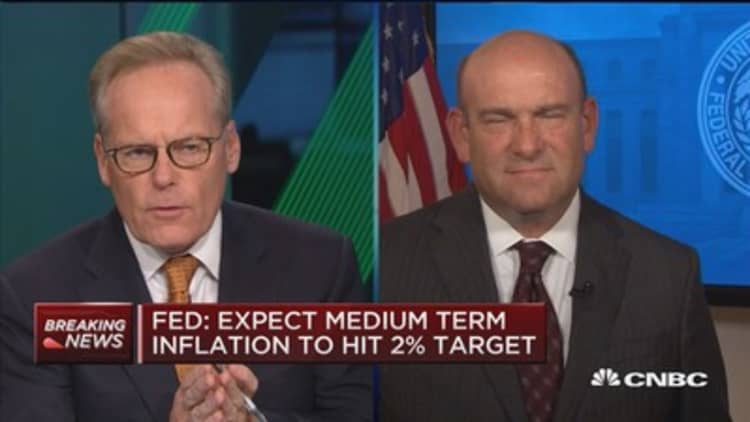
Federal Reserve officials see the economy expanding at a steady clip and indicate that an interest rate hike later this year is a near lock, despite some divisions over where inflation is headed.
Minutes from the September meeting of the policymaking Federal Open Market Committee show members anticipating that the factors slowing down inflation will pass. The expectation is that inflation will hit the 2 percent target the central bank believes is consistent with healthy growth.
In conjunction with those sentiments, the FOMC indicated that a third increase in 2017 of its benchmark funds rate is warranted.
"Consistent with the expectation that a gradual rise in the Federal funds rate would be appropriate, many participants thought that another increase in the target range later this year was likely to be warranted if the medium-term outlook remained broadly unchanged," the meeting summary said.
Traders broadly expect the Fed to hike in December. Just a month or so ago, traders in the federal funds futures market gave little chance to another move in 2017.
Where the Fed goes in the future seems to be more of an open question, as members debated over whether low wage and price pressures are more of a long-term problem. The concerns over inflation come as the Fed's preferred gauge is showing a gain of only about 1.4 percent.
Despite the low readings, confidence remained fairly high that the 2 percent target is likely to be hit soon.
"Many participants continued to believe that the cyclical pressures associated with a tightening labor market or an economy operating above its potential were likely to show through to higher inflation over the medium term," the minutes said. "In addition, many judged that at least part of the softening in inflation this year was the result of idiosyncratic or one-time factors, and, thus, their effects were likely to fade over time."
Ultimately the Fed decided against a rate increase at the meeting, opting instead to announce that in October it would begin reducing its $4.5 trillion balance sheet, most of which contains bonds it bought during its crisis-era stimulus efforts. The reduction will be accomplished by allowing a small part of the proceeds it gets from maturing bonds to roll off. FOMC members expressed confidence that market reaction will be minimal.
Otherwise, Fed officials judged the economy to be growing at a solid pace, as business contacts "appeared to have become more confident about the economic outlook."
Economic data points have been on a roll lately, with the Citi Economic Surprise Index turning around after hitting multiyear lows over the summer, sales growing and GDP up 3.1 percent in the second quarter.
Still, Fed officials worried that lower inflation might be a longer-term problem than the Fed expects. They noted a lack of wage pressures that could be tied to more fundamental causes.
"Many participants expressed concern that the low inflation readings this year might reflect not only transitory factors," the minutes said, noting "a few of these participants thought that no further increases in the Federal funds rate were called for in the near term."
However, others said they were more concerned about underestimating the longer-term path of inflation and making a policy mistake in that regard.
"These participants cautioned that an unduly slow pace in removing policy accommodation could result in an overshoot of the Committee's inflation objective in the medium term that would likely be costly to reverse or could lead to an intensification of financial stability risks or to other imbalances that might prove difficult to unwind," the minutes said.
Members expressed little concern over the longer-term impact from Hurricanes Harvey and Irma. They expected the history-making storms to depress activity in the third quarter, but that would reverse in Q4 as "as rebuilding got under way and economic activity in the affected areas resumed."
Committee members also were expecting a temporary hit to the jobs picture in September. Nonfarm payrolls for the month declined by 33,000, though average hourly earnings increased 2.9 percent on an annualized basis.
WATCH: Pro says Fed minutes validate December rate hike



